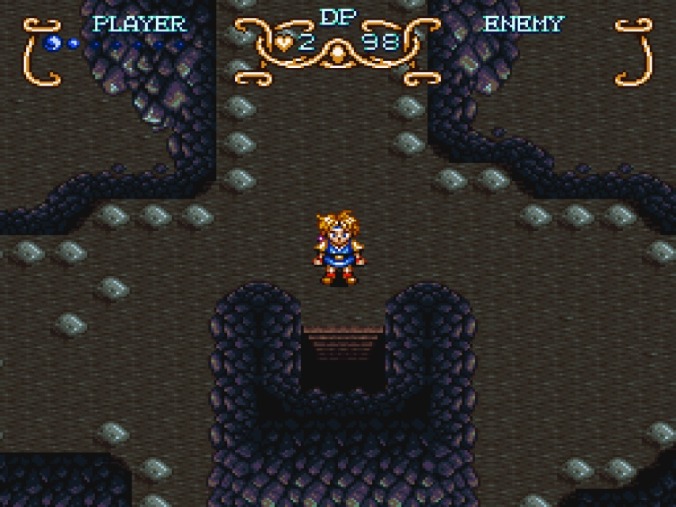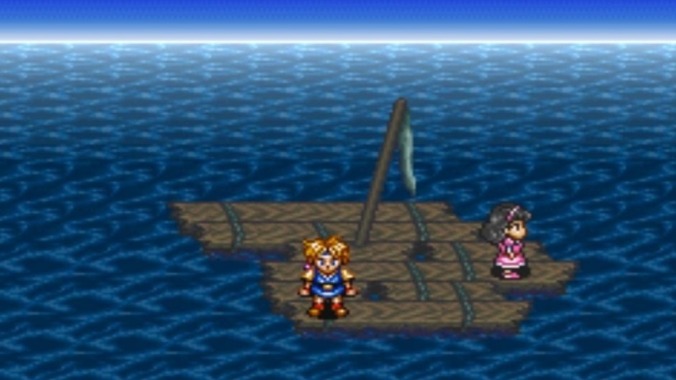Quintet’s Illusion of Gaia was released 30 years ago this week for the console that in my mind is still the king of RPGs, the Super Nintendo. It has a similar aesthetic to Chrono Trigger, with combat reminiscent of The Legend of Zelda: A Link To The Past, but because of this it runs the risk of being overshadowed by these more successful peers. It simply doesn’t have the iconic Akira Toriyama character designs of Chrono Trigger, nor did it become foundational to the genre like A Link To The Past. What sets Illusion of Gaia apart is the way it builds immersion. It can be a quiet, wandering game, and that’s part of its strength. It’s not afraid to put the player through something boring, to make them sit and wait, before reaching the next peak, and I love it for that.
Illusion of Gaia follows Will on his journey to collect six statues in order to stop a giant meteor from colliding with the Earth. Will enlists the aid of his friends who are mostly there for moral support and drama; they never become playable nor do they have powers like Will. The actions Will can take are specific and limited. He swings his sword, turns into a larger man who swings a larger sword, or uses unlocked movement commands to overcome puzzles built for those commands. Eventually, as Will unlocks his final form—the neon aqueous Shadow—he still only has about two abilities at any given time. It’s simple but effective, especially for a game putting so much emphasis on your interactions outside of combat.
Typically when I think of monotony in games from the ‘90s, I’m thinking of grinding. I’m thinking of the hours spent killing the same monsters over and over again to get my Final Fantasy party up to snuff. Illusion of Gaia doesn’t allow for that. Once enemies are defeated they don’t respawn unless you get a game over. Experience doesn’t exist at all in this game. You aren’t becoming stronger relative to the number of enemies you defeat. Instead, stat increases are earned by clearing an entire floor of its monsters. Once you’ve entered, the map shows the number of enemies present. When they’re all defeated, you get a reward. It can be arduous in its own way, asking you to be exhaustive to achieve your goal rather than letting you fight enemies until you feel you’re strong enough to move on.

The combat to me is the least exciting part of this game. The dungeons have some fun layouts and unique boss designs, but the heart of things lies in the time spent with your friends wandering from town to town trying to figure out what is actually going on. These moments are slow and meandering by design. When you enter a new space you walk around to explore it, but often you won’t find anything. You just wander and wait until a friend of yours tells you what to do next or enough time passes to trigger an event. The main character is at the mercy of time, and I’ve never played a game so insistent on the solution being to wait. There’s a section where Will and his love interest, the princess Kara, end up lost at sea on a raft. He can walk the short distance of the raft, he can swing his sword, but those actions are completely ineffective at getting safely to land. In that time, all he can really do is wait and talk with Kara. Besides a very brief fishing mission, the section isn’t game-ified at all. Over two weeks of game time pass where you haven’t fought a monster, you haven’t used your powers to find some solution. You’ve just waited, and I think that’s wonderful.
This genre is Role Playing Games, and so often games forget to give you a role to play. They move us through these adventures, but the emphasis is put on the “game” rather than the “role.”Illusion of Gaia flips that on its head. A game has the burden of being entertaining the entire time, of providing engagement and enough fun to keep the player invested, but playing a role shouldn’t be that way. Some experiences are bad. Being lost at sea is not actually fun, and Illusion of Gaia knows that. It’s not afraid to make a situation that is inarguably bad and helpless feel bad and helpless, and in that surrender it makes room for something else. Wistfulness, boredom, hope—the characters feel all of this while they wait to be saved. A cut scene could convey “they were lost at sea for a long time but then escaped” but making the player sit through half a month where each day all they can do is press “A” to further what little dialogue our shipwrecked characters have is inspired. You’re not told they’re lost at sea; you’re lost there with them.
While the shipwreck section is a shining example of this, smaller moments of waiting and monotony are all over the game, and I find them remarkable. There’s a section where to get into a popular shop you need to wait in line. Nothing to do, no one to talk to, you just wait in a line and move ahead one step at a time until finally it’s your turn to enter the store. I clapped. (That was easy because I could put the controller down. There was nothing for me to do. I was just waiting in line). Also, it takes a long time. The decision to make you sit through something so commonplace serves as a humbling reminder that even if you are the great hero of destiny, you still have to abide by the societal structures of your world. Not only that, but the game rewards that willingness to play the role you’re given. You get two great items for free if you’re willing to wait, and nothing if you try to enter the store another way.
I’m not playing ‘90s fantasy RPGs to hone my craft or for practical time management. I’m coming to them to have some fun in another world, to relax before bed, to go on a little journey with some pals, to waste time. Ideally, I’d like to be immersed, and Illusion Of Gaia does that wonderfully. What it lacks in combat, it makes up for in these quiet moments that are allowed to be fun or cute or bad or trite. It fills your time with them, which rewards your investment. If slogging through some of the dungeons is waiting in line, then the moments in between where the characters get to grow and interact is the cool thing you get from the store once you’re inside.
Dave Tomaine is a comic writer and musician from Philadelphia. You can find him at @cavedomain and @FFBedtime on Twitter.

